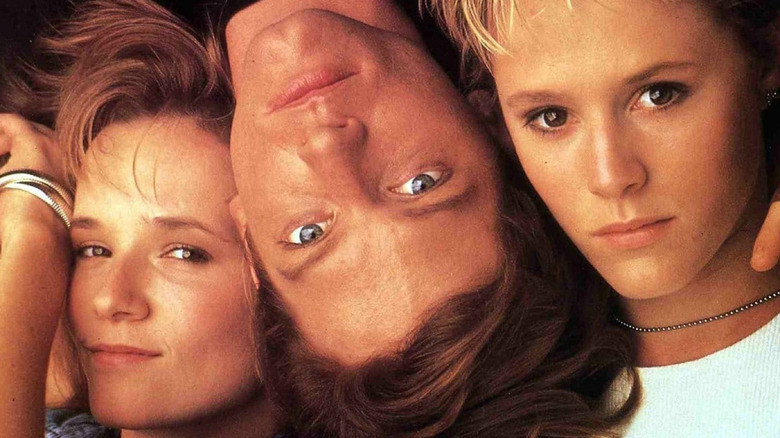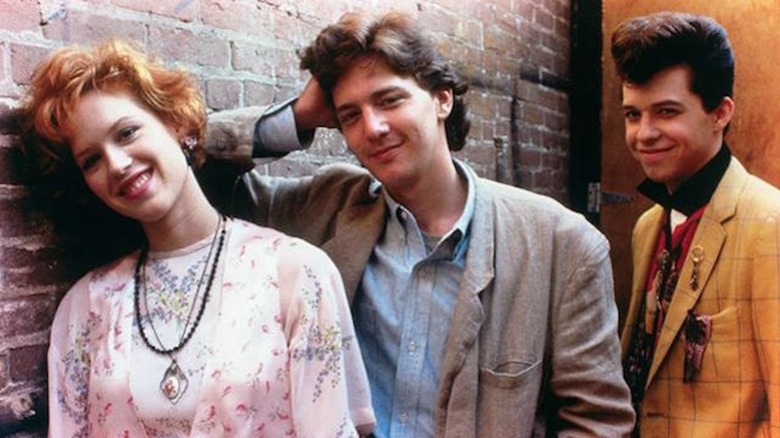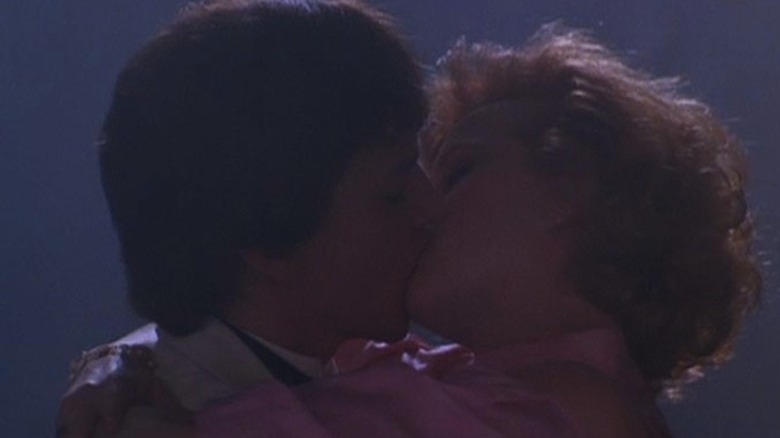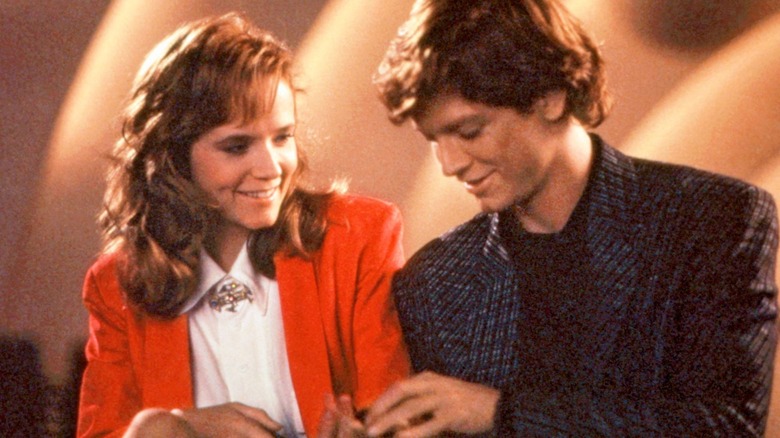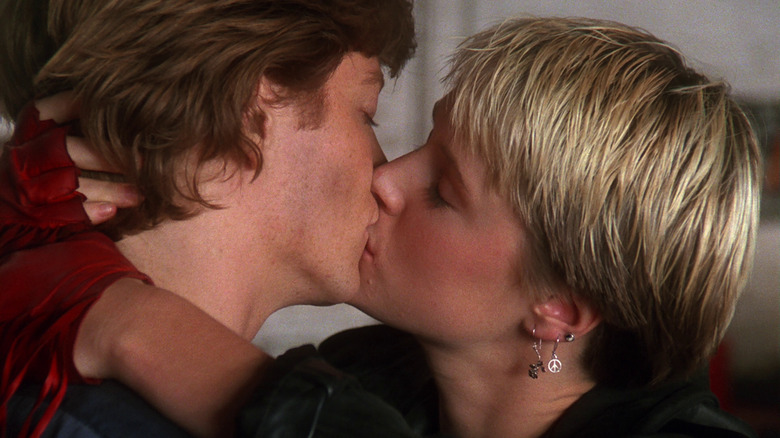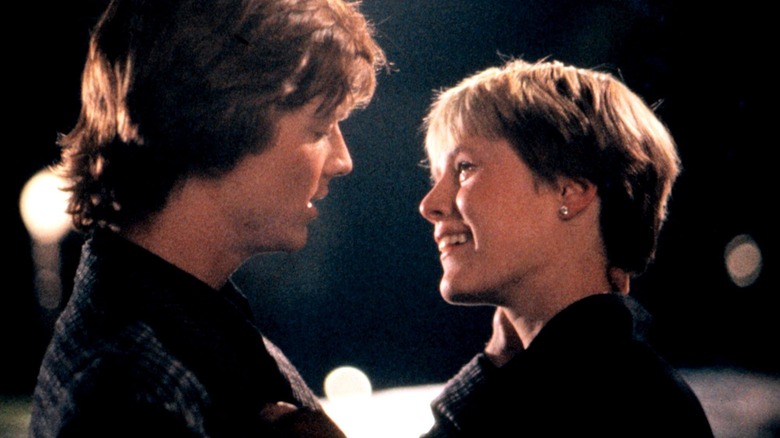How Some Kind Of Wonderful Fixed The Problems Of Pretty In Pink
When it comes to John Hughes films, it can be difficult to pick a favorite. The late filmmaker was behind so many '80s coming-of-age classics, not to mention the inception of certain franchises that are still spawning sequels. Hughes was incredibly prolific, specifically as a writer, and though his credits are far too numerous to list here, chances are you've both seen and loved at least one of his movies, whether you know it or not.
Introduced to his work by my older sister, I couldn't get enough of these films as a kid. From "Sixteen Candles" to "The Breakfast Club" to "Ferris Bueller's Day Off," I was completely obsessed. That said, I always had two favorites: "Pretty in Pink" and "Some Kind of Wonderful." Both movies were written by Hughes and directed by Howard Deutch. Though I didn't notice back then, as an adult, it's easy to see how one is the inverse of the other. The movies are gender-swapped, but each features a lead from the supposed wrong side of the tracks falling for someone deemed out of their league, all while their best friend, who's secretly in love with them, looks on helplessly.
The plots may share plenty of similarities, but the characters are markedly different, and most crucially, the films end on a completely separate note. Oddly enough, the way "Some Kind of Wonderful" ended was much more in line with how Hughes had wanted "Pretty in Pink" to wrap up in the first place. While "Some Kind of Wonderful" wasn't made as a direct response to "Pretty in Pink," the film evolved quite a bit from the way Hughes had initially conceived it and in the process, wound up much closer in tone to its predecessor. You could even say "Some Kind of Wonderful" succeeds in certain ways in which "Pretty in Pink" fails, particularly in terms of the story Hughes was originally trying to tell.
Try a little tenderness
"Pretty in Pink" centers on Andie (Molly Ringwald), a sartorially inclined teenage girl from a lower-class family who's trying to navigate a high school largely populated by wealthy classmates. Beside her as always is her best friend who desperately wants to be more, Duckie (Jon Cryer). Things get complicated when Andie starts dating a guy so rich his name is Blane (Andrew McCarthy) — though admittedly, he is quite charming. Blane's friends are decidedly uncool about his romance with Andie, particularly Steff (James Spader), and eventually, Blane succumbs to peer pressure and ditches Andie before prom. Wearing a dress she made herself, Andie shows up to the dance alone, but before walking in, she's joined by Duckie, who's attempting to redeem himself for the past hour of bad behavior.
In the initial cut of "Pretty in Pink," this was how the movie ended. McCarthy told The New Yorker:
"I showed up at the prom, alone, and Andie hooked up with Duckie, and they were together. And I was just with some other rich girl on the other side of the room. The audience didn't like that we didn't get together when they did a test screening, so John rewrote it so that I go up to Molly and tell her, basically, 'You're wonderful. I'm a jerk. I'm sorry. I love you.' And then we kiss in front of car headlights."
McCarthy had actually shaved his head for a play and had to wear a wig during the reshoot. He is, of course, referring to that swoon-worthy ending that unfolds to OMD's "If You Leave" — speaking of which, what a great soundtrack this movie had! Aside from that track, the film features New Order, The Smiths, The Psychedelic Furs (the movie was named for their song) and Otis Redding, just to name a few.
If you leave
The final scene of "Pretty in Pink" remains an iconic '80s moment, but that actually wasn't the way Hughes chose to wrap up the movie initially. In fact, McCarthy hated the original ending so much he tried to get out of filming. The actor told The New Yorker:
"I didn't read the script until I was on the plane out to Los Angeles, and I was shocked that Blane turned out to be sort of spineless. When I landed, I called [my agent] and said, 'You gotta get me out of this movie! This guy's a jerk. He's just, like, a wimpy loser.' And they said, 'Honey, you read the script. You knew what it was.' And I was, like, 'Um ... yeah, O.K.' So when we reshot it, the audience seemed to agree that it was better if they got together. It was a fairy tale, so it has to end in a certain way."
Test audiences agreed with McCarthy's assessment. They literally booed the scene in which Andie winds up with Duckie. This led to the ending being completely rewritten.
According to Hollywood legend, "Some Kind of Wonderful" was penned in frustration of the newly devised ending for "Pretty in Pink." However, director Howard Deutch told Screen Rant:
"No, he [Hughes] had actually written the script prior to me finishing Pretty in Pink. But, it is true that the ending of 'Some Kind of Wonderful' is more in the spirit with what the original ending of 'Pretty in Pink' was, where true love endures. So it isn't a surprise ending. There's a triangle, and I don't think you know until the end exactly where it's going to end up, but yeah, I think it's more in the spirit of the original ending."
A very different movie
Interestingly, "Some Kind of Wonderful" started out as a completely different movie than the one that hit theaters. It was much more a broad comedy that focused primarily on a guy who somehow manages to win a date with the most popular girl in school. However, there was some trouble finding the right actors for this version of the film. Hughes actually tried to cast Ringwald and McCarthy as the film's leads, though both turned down the roles. Ringwald told The Atlantic, "I declined because I felt like the script wasn't strong enough and was too derivative of the other films I'd already made with John."
According to Los Angeles Magazine, the casting difficulties ultimately led to a falling out between Deutch and Hughes when the former suggested they scrap the project. "Valley Girl" and "Real Genius" director Martha Coolidge was then hired to helm "Some Kind of Wonderful." Eric Stoltz and Mary Stuart Masterson were cast as Keith and Watts, respectively, but Amanda and her boyfriend Hardy were initially played by Kim Delaney and Kyle MacLachlan. Eventually, Hughes and Deutch mended fences and Coolidge has stated this led to her getting fired, as well as the recasting of Amanda and Hardy with Lea Thompson and Craig Sheffer. "Some Kind of Wonderful" is one of Hughes' best films, though I can't help but be curious about what Coolidge would've done with his script.
A second chance at a different ending
"Some Kind of Wonderful," which released in 1987, follows Keith, an aspiring artist who splits his time between high school and working as a mechanic. While his dedicated best friend Watts, a drummer and fellow outcast, struggles to hide her feelings for him, Keith pines for Amanda, the most popular girl in school. He actually gets his chance, but things are further complicated by her rich jerk of an ex-boyfriend Hardy, who's determined to punish her for moving on. Despite his date with Amanda going well and his triumph over Hardy, Keith realizes by movie's end that it's been Watts all along and the film credits roll not only with them together, but also with Amanda happily on her own. It's an ending that truly feels earned for all the film's main characters.
Like "Pretty in Pink," music played a vital role in "Some Kind of Wonderful," with each main character being named for The Rolling Stones: Keith for Keith Richards, Watts for Charlie Watts, and Amanda Jones for the song. Masterson even told EW that though the script went through drastic rewrites, the soundtrack was already decided on ahead of time and never changed.
The films each have a great supporting cast as well. "Some Kind of Wonderful" has a delightful ancillary character in Duncan (Elias Koteas), and Sheffer is the ultimate douche as Hardy. Then again, "Pretty in Pink" has the amazing Annie Potts and the incomparable, late Harry Dean Stanton, not to mention James Spader at his most James Spader-iest — even if he would play essentially the same character in "Less Than Zero" later that same year.
I can't help falling in love with you
While both films feature a similar love triangle, the characters are quite distinct. "Pretty in Pink" had audiences clearly rooting for Blane to win out over Duckie. Perhaps this is because while Duckie is certainly a lovable character, his actions in the film don't render him particularly worthy of winning Andie's affections — at least not until he acts like a real friend to her at the end of the movie. I have to admit, my young heart belonged to McCarthy, so I was also rooting for Blane.
The answer may seem simple in "Pretty in Pink," but "Some Kind of Wonderful" was a bit more complex. For one thing, Amanda was well-defined beyond being popular. In fact, she wasn't even wealthy, having gained status based on her looks, something the character was clearly uncomfortable with. Watts was also a much better friend to Keith throughout the movie than Duckie was to Andie, despite the fact that she was clearly in love with him. Stoltz and Masterson have amazing chemistry — that practice kiss scene! — and honestly, as kid I was in love with both of them. Also, while Duckie is happy because he winds up with a different date at the end of "Pretty in Pink," Amanda realizes the best thing she can do for herself is stand on her own. None of these characters are perfect, least of all Keith, but that's what makes them so relatable.
Don't get me wrong, I love "Pretty in Pink," but "Some Kind of Wonderful" is better. The characters have so much more depth. I'm not sure why it isn't more beloved, but it should be for Masterson's performance alone. How could anyone not root for her? Perhaps it's the lack of Brat Pack stars, but whatever the reason, this movie deserves more attention. The end of "Pretty in Pink" may have made me swoon, but the conclusion of "Some Kind of Wonderful" warms my heart every time.
